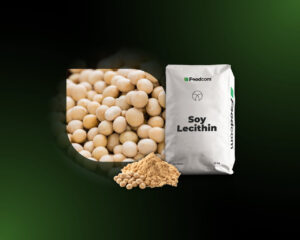- China plans to reduce the share of soybean meal in animal feed to 10% by 2030, aiming for greater independence from imports.
- This reduction could lower annual soybean imports by up to 10 million tonnes, mainly from the US and Brazil.
- The government is promoting protein alternatives such as high-protein corn, synthetic amino acids and insect proteins.
- Small farms are struggling to implement the changes due to high costs and declining animal productivity.
Less soy in Chinese feed – more independence
China has decided to reduce the share of soya meal in animal feed to 10% by 2030, marking a clear step towards independence from soya imports – mainly from the US and Brazil. In 2023, the share was still 13% and had previously reached as high as 17%. With these measures, the Middle Kingdom can reduce its soybean imports by 10 million tonnes per year – almost half of its total imports from the USA.
This is part of a broader food security strategy that also includes the development of alternative protein sources such as high-protein maize, synthetic amino acids and even insect proteins. China’s aim is to diversify its feed and become less dependent on volatile international markets.
New challenges for smaller farms
While large Chinese agricultural corporations such as Muyuan Foods and Wens Foodstuff are already successfully implementing feeds with lower soybean meal content (even below 6%), small farmers may struggle to adapt to the new realities. They lack both the technology and the financial resources for expensive substitutes.
As a result, soya meal still accounts for 15-20% of the feed mix on many small farms. In addition, farmers are seeing decreases in animal weight gain with lower soy protein content. Although the government is promoting substitutes such as fermented straw or insect protein, their price is often higher than traditional meal – which can delay the implementation of large-scale changes.

![China restricts soybean meal in animal feed – a change that could shake up the protein market [World News] China restricts soybean meal in animal feed – a change that could shake up the protein market [World News]](https://foodcom.pl/wp-content/uploads/2023/09/Foodcom_World_News_Dairy-1520x760.jpg)


![Canada is developing new non-GMO oat varieties [World News] Canada is developing new non-GMO oat varieties [World News]](https://foodcom.pl/wp-content/uploads/2025/03/News-world_22-1-600x300.png)
![India significantly increases palm oil imports in May [World News] India significantly increases palm oil imports in May [World News]](https://foodcom.pl/wp-content/uploads/2025/03/News-world_2-600x300.png)
![South African macadamia growers seek new markets after announcement of US tariffs [World News] South African macadamia growers seek new markets after announcement of US tariffs [World News]](https://foodcom.pl/wp-content/uploads/2025/03/News-world_4-600x300.png)

